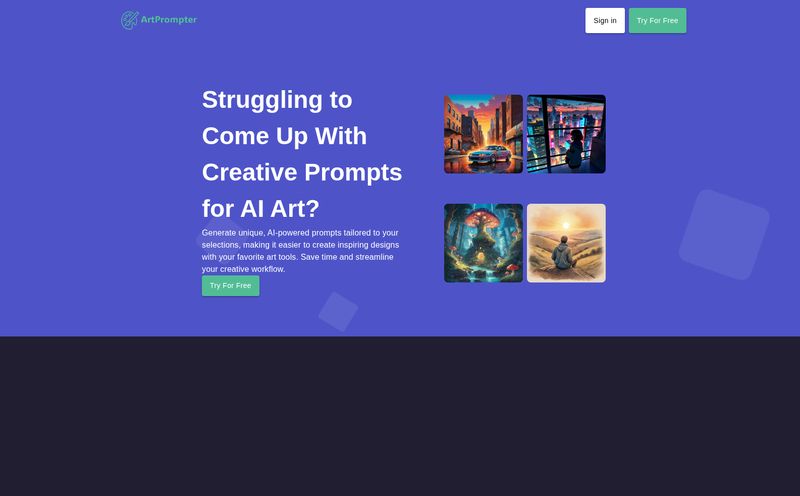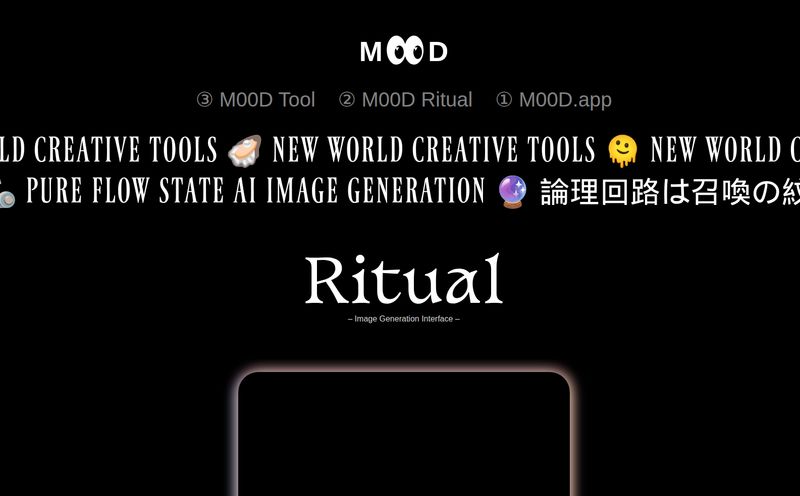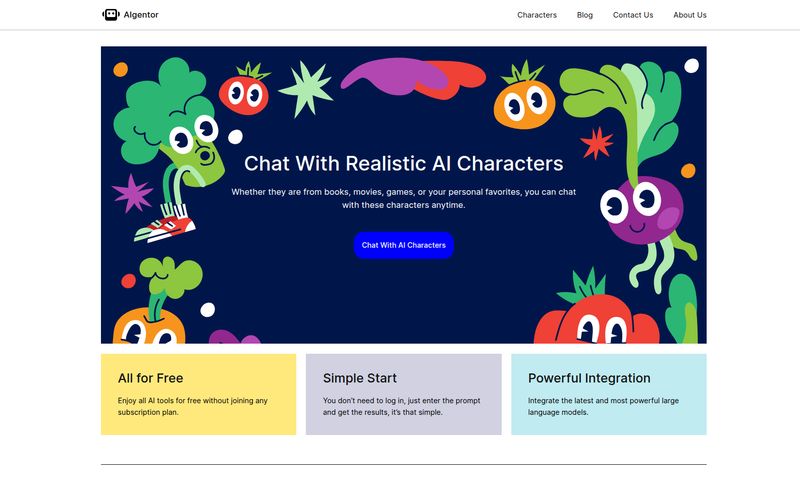Remember that time when everyone’s Instagram and TikTok feeds were suddenly flooded with those impossibly cool, painterly AI portraits? Yeah, you know the ones. It felt like overnight, every other person I knew had a profile picture that looked like it was commissioned by a Renaissance master or sketched by a Ghibli animator. As someone who’s been tracking SEO and social trends for years, I saw it not just as a passing fad, but as a signpost. A big, flashing neon signpost pointing to where content creation is headed.
So, naturally, when I started hearing the buzz about AI Mirror, my curiosity was piqued. Another one? Is this just a rehash of the last big thing, or does it bring something new to the table? The promise is simple and seductive: transform your everyday photos and videos into stunning anime-style creations. It’s like having a little animation studio in your pocket. I had to see for myself.

Visit AI Mirror
So, What's the Real Deal with AI Mirror?
At its core, AI Mirror is a mobile app powered by what they call Generative AI. It’s built by a company called Polyverse, and their whole game is developing these kinds of AI-powered applications. The app's main trick is taking your selfies, group photos, pet pics—you name it—and redrawing them in a whole host of different artistic styles, with a heavy emphasis on anime and cartoons. It's not just slapping a filter on top, like those old-school photo apps. No, this is about the AI analyzing the image and generating a completely new one based on the original's composition. It's pretty wild stuff.
It’s aimed squarely at anyone who wants to spice up their social media presence, create a unique avatar, or just have a bit of fun. You dont need to know a thing about art or photo editing. That’s the beauty of it. The AI does all the heavy lifting.
The Coolest Features I Found
I spent a good few hours playing around with this thing, feeding it everything from a photo of my morning coffee to a blurry picture of my cat. Here’s what stood out.
Transforming Photos and Videos into Art
This is the main event, of course. You pick a photo or a video clip, choose a style, and wait for the magic. The sheer variety of presets is impressive. You can go for a classic 90s anime look, a modern webtoon style, a gritty comic book aesthetic, or even something that looks like it belongs in a video game. I found myself just endlessly scrolling through the options, thinking, “Ooh, what would I look like as a shonen protagonist?” The results can be genuinely stunning. A mundane selfie in my home office suddenly became a dramatic, windswept portrait. It's addicting.
Image Generation from Just Your Words
This was a pleasant surprise. Like Midjourney or DALL-E, AI Mirror has a text-to-image generator. You can type in a prompt—something like “a cyber-punk cat wearing sunglasses in a neon-lit Tokyo”—and the AI will try to create it from scratch. For a mobile app, the quality is pretty decent. It's not quite on the level of the dedicated, high-powered desktop platforms, but for whipping up a quick concept or a weirdly specific meme? It's fantastic. It’s a feature that adds a whole other layer of creativity to the app.
My Honest Take: The Good, The Bad, and The AI Quirks
Alright, let's get down to it. No tool is perfect, especially in the fast-and-loose world of generative AI. I've always felt that an honest review needs to celebrate the wins but also call out the weird stuff.
On the one hand, the ease of use is a massive win. It’s incredibly intuitive. You tap, you choose, you wait a few seconds, and boom—new art. It's pure, simple fun. For creating eye-catching content for social media without a steep learning curve, it’s a killer app. I got some results that were so cool I immediately wanted to make them my new profile picture everywhere.
However, the AI can sometimes feel like a brilliant but slightly eccentric intern. It gets the big picture right, but fumbles the details. You'll occasionally get the classic AI artifacts—a slightly misshapen hand, a weirdly blended background object, or eyes that are just a little too far apart. It's the uncanny valley, mobile edition. Some might argue this is part of the charm, a quirk of the technology in its current state. I'm sort of on the fence. It's funny, until you want that one perfect picture and the AI just refuses to draw a normal-looking thumb.
And then there's the privacy question. We have to talk about it. When you upload your face, your kid's photo, or a video of your friends to an app like this, you're sending your personal data to a server somewhere. The company, Polyverse, is a global entity, and while most companies have privacy policies, you're still placing a certain amount of trust in them. I’m not saying it's nefarious, but it’s something every user should be aware of. Always a good idea to at least skim the privacy policy before you give an app access to your entire photo library.
Let's Talk About the Price Tag
So, how much does this all cost? Well, it's not super straightforward. AI Mirror operates on a freemium model, which is common for apps like this. You can download it and use a bunch of the basic features and styles for free. But… and it's a big but… the coolest styles, the highest-resolution exports, faster processing times, and an ad-free experience are usually locked behind a subscription or in-app purchases.
I didn't see a fixed pricing page, as it's all handled within the app itself. Expect to be offered a weekly or yearly subscription plan. This is a pretty standard strategy: get you hooked on the free stuff and then tempt you with the premium features. Is it worth it? That really depends on how much you plan to use it. If you're a content creator or just love the aesthetic, a subscription might be a no-brainer. For a casual user who just wants to try it once or twice, the free version is probably enough.
Frequently Asked Questions About AI Mirror
Is AI Mirror completely free to use?
You can use many of its features for free, but for premium art styles, faster generation, and removing watermarks, you'll likely need to subscribe or make in-app purchases. It follows a typical 'freemium' model.
Can AI Mirror edit videos as well as photos?
Yes! This is one of its standout features. You can apply the same AI art styles to short video clips, turning them into little animated sequences. It's great for making dynamic Instagram Stories or TikToks.
Are my photos and data safe when I use AI Mirror?
This is a valid concern with any AI app. Your images are uploaded to the company's servers for processing. While most companies have security measures in place, it's always wise to review their privacy policy to understand how your data is handled. I'd personally avoid uploading highly sensitive images.
What kind of art styles can I create with this app?
The app heavily focuses on Japanese anime and manga styles, but it also includes presets for American-style comics, various cartoon looks, video game art, and more abstract artistic filters. There's a wide variety to experiment with.
Do I need to be an artist or tech-savvy to use AI Mirror?
Absolutely not. It’s designed for everyone. The user interface is very simple—if you can use Instagram, you can use AI Mirror. The AI does all the complicated work for you.
Final Thoughts: Is AI Mirror Worth the Download?
So, after all my testing and tinkering, what's the verdict? I've gotta say, AI Mirror is a genuinely fun and powerful tool for what it is. It successfully taps into that desire for personalization and creativity that drives so much of social media today. It lowers the barrier to creating something that looks cool and unique.
It’s not a professional design suite, and the AI has its moments of weirdness. But that’s not the point. The point is to take a boring photo and, with a single tap, see a version of yourself you've never seen before—as a hero, a villain, or just a character in a beautiful, animated world. And on that front, it totally delivers. If you're looking for a new way to jazz up your digital presence or just kill an afternoon with some creative fun, give it a shot. Just keep an eye on those subscription pop-ups.
Reference and Sources
- An overview of Generative AI trends in social media can be found in articles by publications like Forbes.
- To learn more about the broader AI art movement, platforms like Midjourney and OpenAI's DALL-E 3 are the current industry leaders.


